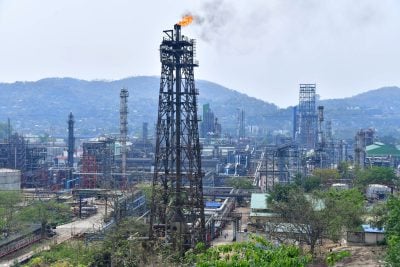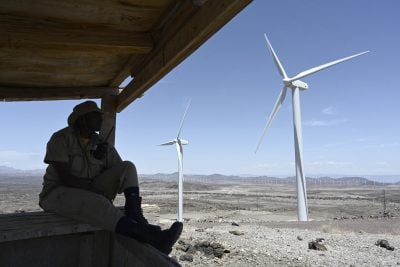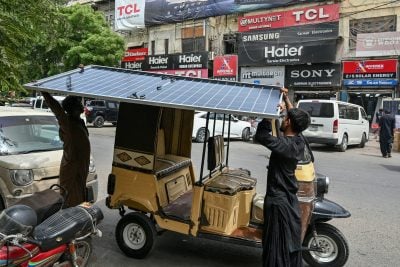Central Africa, more renowned for insecurity and coups d’etat than commerce, is often left out of discussions about Africa’s energy transition.
The sub-region has the continent’s poorest electricity access. Today over 580m Africans lack access to electricity and 730m lack access to clean fuels, according to the International Energy Agency, and many of them live in the continent’s midriff.
Africa’s rapid economic growth in the past decade, driven partly by energy discoveries and electricity expansion, has left a cohort of Central African countries behind.
Now, though, Central African nations hope to boost oil and gas supply and take control of their energy futures through an oil and gas pipeline network involving Equatorial Guinea, Cameroon, Gabon, Chad, the Democratic Republic of Congo, the Republic of Congo and Africa’s second biggest oil producer, Angola.
The participating countries aim to build three multinational oil and gas pipeline systems measuring over 6,500km to “ensure the survival of the entire region in the energy sector,” according to Gabriel Mbaga Obiang Lima, minister of mines and hydrocarbons of Equatorial Guinea.
The network is planned to include storage depots, liquefied natural gas terminals, at least three refineries and gas-fired power plants.
Proponents say the ambitious partnership could help end energy poverty for some of the world’s most vulnerable people – and boost long-suffering economies.
Region needs reliable power
The coronavirus pandemic, which confined people to their homes, and Russia’s war in Ukraine have brought into stark relief the fragility of African energy and the enormity of the energy poverty challenge. The World Bank’s former Ease of Doing Business survey consistently ranked access to reliable power as one of the most significant constraints to business in Africa.
Nowhere is that clearer than in Central Africa, where just 27% of people have access to electricity, compared to 52% in West Africa, 48% in Southern African and 37% in East Africa. Currently, the region depends heavily on hydropower, which makes up 72% of its paltry electricity output.
However the countries included in the partnership, sealed with a memorandum of understanding (MoU) at the Central African Business Forum in Douala, Cameroon in September, are all either oil producers or home to vast untapped reserves.
Total oil reserves in Central Africa are estimated at 31.3bn barrels. Of Africa’s top 10 oil producers, five are in the region: Gabon, Republic of Congo, Equatorial Guinea, Chad and Angola. Still, most of these countries struggle with regular fuel and power shortages and import petroleum products. For proponents of African oil and gas, that is unacceptable.
Aim is to eradicate energy poverty, says minister
Obiang Lima said at the time of the signing that the aim of the pipeline partnership is to eradicate energy poverty by 2030, usher in future energy security and create a booming Central African energy market.
He said the project was inspired by West Africa’s gas pipeline linking Nigeria, Benin, Togo and Ghana and the European energy model, where Rotterdam acts as a refining and distribution hub for several countries.
“It will not be cheap, or easy, but if it is done as a collaboration, it will work,” Lima said, adding that the network will stop throngs of polluting trucks from having to crisscross the vast region.
The MoU was also signed by the African Petroleum Producers’ Organisation (APPO), a club of African oil-producing countries. Its secretary general, Omar Farouk Ibrahim, predicted that the ambitious project would dramatically change the economies of participating countries.
“It will take energy from areas of abundance to areas of need within the Central African subregion. It will integrate and energise national economies of the Central African subregion,” he said.
NJ Ayuk, chairman of the African Energy Chamber, an organisation that lobbies for the industry, tells African Business he is confident the “amazing project” will “deal with energy security within the Central African region”.
The market dynamics are starting to change, he says, with energy demand growing. Currently the region’s only pipeline is the Chad-Cameroon conduit that exports oil out of Africa, and therefore does not adequately benefit local communities.
Scepticism over funding
Carole Nakhle, a leading energy expert and CEO of Crystol Energy, is more sceptical.
“It would be too simplistic to believe that the pipeline will lift people out of poverty – the evidence of the resource curse is well documented,” she says. “It takes much more than a pipeline to support sustainable economic growth.”
Chigozie Nweke-Eze, an energy and sustainability expert and founder of Integrated Africa Power, tells African Business that Central African countries would be better off developing the DRC’s Inga Dam, which could provide hydroelectric power to the region.
“It is a renewable energy project that can serve as a base load,” he says. “And also they are more likely to get financing (because it is a climate mitigation project).”
Questions also remain over funding, even though Lima said regional financial institutions were prepared to finance the project. Pooling resources from several nations offers an interesting prospect for cash-strapped African governments, but it will not be enough.
“Typically, when oil and gas prices are up, governments tend to announce new projects or revive older projects such as building a pipeline or a refinery. Often, those projects don’t see daylight,” says Nakhle.
“The Central African pipeline is an ambitious project and could benefit the region and the countries involved but its success depends on many factors including the institutional framework – which needs further strengthening in the region – as well as commerciality, especially when energy prices retreat.”
Ayuk says there is a possibility of China, India or Russia potentially backing the project, with Western countries reluctant to support new oil and gas projects in Africa as the world transitions away from dirty fuels. Discussions are said to have begun already with China.
“You’re better off being able to bring in countries that come with free markets, open societies, to be able to build these pipelines in a sustainable way and ensure that the environment is protected and human rights are respected,” says Ayuk.
Regional insecurity poses another major challenge to the ambitious project. Conflict is raging in eastern DRC and Cameroon, while Chad, plagued by insecurity and an ongoing Islamist insurgency, saw a military coup in 2021. At the end of September, democratic elections were pushed back by two years.
Both Chad and the Central African Republic – which neighbours Chad, Cameroon, the Republic of Congo and the DRC and is one of the world’s poorest countries – have for years been in a state of civil war. Realists may question whether Central African governments can cooperate effectively on such a project given how weak and corruption-plagued institutions are in the troubled region.
Project could boost region’s refining capacity
If the Central African pipeline project goes ahead, its most significant aspect might be refineries. A shortage of refineries across sub-Saharan Africa, coupled with soaring oil prices, has left African nations undersupplied. Rising fuel prices across the continent have the potential to fuel unrest.
Refineries across sub-Saharan Africa can theoretically process 1.4m barrels of oil per day but many of them are out of action, meaning only a third of that capacity was refined last year. In Cameroon, Ghana, Senegal and South Africa, refineries have closed, while capacity in Nigeria, the continent’s biggest oil producer, is low (although the new Dangote refinery, expected to open this year, could change things significantly).
Meanwhile, local illegal refineries have been set up in Nigeria and elsewhere, hurting the legal market and creating a new breed of energy profiteers.
Cameroon’s Limbe plant, which once processed 42,000 bpd, shut following a fire in 2018. Angola has a single 65,000 bpd refinery in Luanda despite its 1.1m bpd production.
Getting shuttered refineries up and running again would require considerable investment from poor countries with mountains of external debt and huge budget deficits, leaving oil and gas-rich African nations reliant on imported petroleum products.
The Central African pipeline project could massively boost the region’s refining capacity through new refineries and economic growth. With Western countries scrambling to diversify their energy supplies after developing an addiction to Russian gas, African countries feel they must go it alone.
A question of fairness
The plan could yet draw attacks from environmentalists. Yet African countries, whose contribution to global greenhouse gas emissions has been negligible, say they cannot develop with renewables alone, despite leading the way in green energy such as solar and geothermal. Africa is set to add a billion new citizens between now and 2050 which, alongside industrialisation, will send oil demand surging. It is not clear that supply will match it.
For Ayuk, it is a question of fairness. “We want a just energy transition that is inclusive, equitable and opens the door for everybody to have a shot,” he says. “At the end of the day it’s going to be about an energy mix. We need oil, we need natural gas.”
Want to continue reading? Subscribe today.
You've read all your free articles for this month! Subscribe now to enjoy full access to our content.
Digital Monthly
£8.00 / month
Receive full unlimited access to our articles, opinions, podcasts and more.
Digital Yearly
£70.00 / year
Our best value offer - save £26 and gain access to all of our digital content for an entire year!
 Sign in with Google
Sign in with Google 



